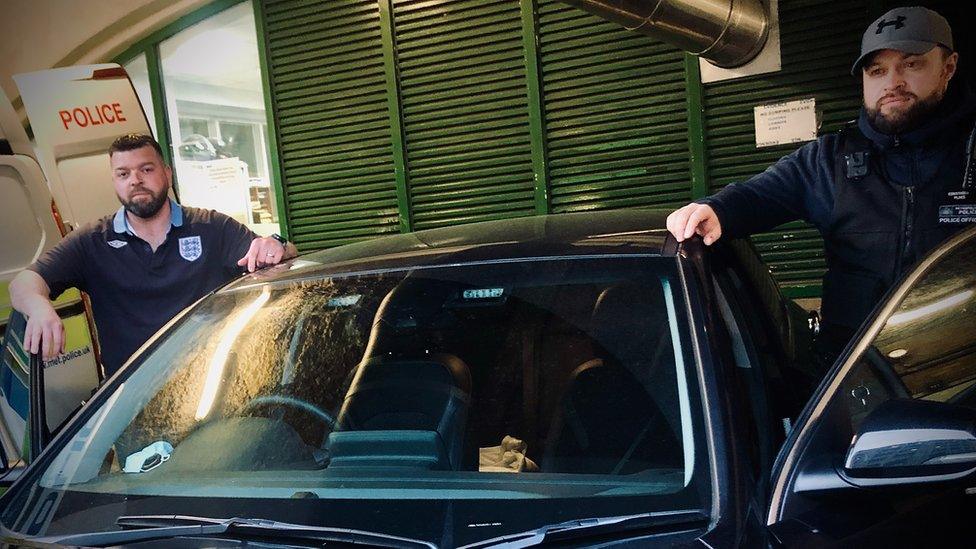Inside a Met Police 'violence suppression unit'
- Published

Sgt Aaron Griggs (left) and PC Al Place make up a two-man VSU team in Hackney, east London
Over 6,000 people have been arrested by "violence suppression units" (VSUs) in areas where knife and gun crime is most prevalent, the Met Police says.
The VSUs have seized 1,142 weapons and £1.5m in "criminal cash" since their creation, the force says.
Violent crime in London has fallen in the past year, but it is thought this could be due to the pandemic.
BBC Radio 5 Live was given access to a two-man VSU team working in Hackney, a year on from the creation of the units.
Driving an unmarked patrol car, Sgt Aaron Griggs explained what suppression meant when it came to policing violent crime.
"To suppress is ideally preventing the crime before it happens, ideally engaging with the local community, primarily the youngsters," he said.
The officers spent much of a 10-hour shift trying to stop two or three young men in masks and hoodies on bikes, suspected of carrying out robberies in a busy area of Hackney.
They were spotted several times and pursued through crowded streets, often at high speed, but never caught.
VSU police officers are dedicated to specific areas, giving them a greater knowledge of the places and people.
They work in plain-clothes and include officers more experienced in dealing with street crime. They attempt to spot offenders based on their body language and how they react to being the subject of attention.
The Met said in their first year, VSUs had resulted in the seizure of a kilo of heroin, the discovery of a loaded gun, and the arrest of suspects in a stabbing in the London borough of Haringey.
Other results included:
6,031 arrests made for violent offences including robbery, GBH and murder
1,142 knives and weapons seized
81 firearms recovered
1,256 warrants carried out
£1.5m in cash from criminality confiscated
3,000 weapon sweeps carried out
Much of their work on the streets is aimed at establishing whether to stop and search suspects.
With Black Lives Matter and heightened awareness of the sensitivities of stop and search, the VSU approach has added to concerns among critics of the tactic. Some say that it is racist and doesn't work.
Last year the mayor of London published early figures, external suggesting seven to eight per cent of stop and search incidents were due to the new VSUs.
Stop and search often results in more black and ethnic minority suspects being apprehended than would be proportionate for the population.
But Sgt Griggs said it was a vital tool as long as police adopted a friendly and casual manner towards suspects.
"It's easier for them and they're more forthcoming with information," he said.
Sgt Griggs and his colleague PC Al Place searched three young black men on the basis that they were suspiciously parked in a back street with no obvious reason for being there.
The officers felt justified in moving in when one of the men threw litter from a window.
Nothing was found during the search but Sgt Greggs said he recognised one of the three as a member of a gang.
"They're well known to us: robberies, drugs. I think the last time they were arrested was [for] possession of a sword," he said.
Metropolitan Police Commander Alex Murray said VSU officers had a "passion for bearing down on violent crime".
But he told 5 Live's Naga Munchetty the police were often accused of being racist.
"That's really hard for officers, particularly when their motivation is to prevent violence which is disproportionately focused on some groups within the community," he said.
"There is racism, it has existed, and we are working really hard in the Met to deal with that, and perhaps in some of those areas, there's an absence of trust because of what's happened in the past and sometimes what's happening now."
Another focus for the VSUs is to try to build bridges with local communities.
In Croydon, police took part in training sessions to develop relationships and learn more about their local area.
Other teams have gone out on patrol with a young people's action group to improve their awareness.